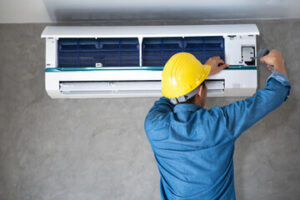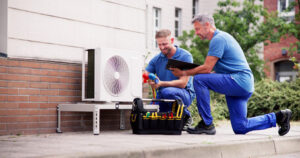AC Repair Round Rock TX involves inspecting, troubleshooting and repairing air conditioners in homes or businesses. This can include a variety of tasks, from cleaning clogged filters to replacing damaged parts.

Prior to beginning any work, the service technician will make sure that the power to the AC unit is turned off by checking the circuit breakers. They will also check and clean the evaporator coils to avoid dust build-up.
While summer brings many wonderful sounds, including birds chirping, barbecues sizzling, and lawn mowers roaring, one sound you definitely shouldn’t hear from your air conditioner is a screeching or banging noise. These unusual sounds can be a sign of an AC issue that could grow into something much more expensive and dangerous if left untreated.
Clicking noises from your indoor air conditioning unit are often caused by loose or misaligned parts. If you’re comfortable working with your air conditioning unit, you might be able to tighten or re-align these parts yourself. However, electrical problems inside your air conditioner are usually not DIY-friendly, and the wrong fix may lead to additional damage and escalating repair costs down the road.
Rattling noises are usually a result of an AC fan bearing or motor problem that needs to be re-lubricated. If these issues aren’t repaired promptly, they may damage the internal wiring and cause electrical problems inside your unit. If you suspect that this is the case, turn off your air conditioner and contact a licensed professional right away.
Buzzing or humming noises are usually signs of electrical problems within your AC system. These issues can be extremely dangerous and should only be dealt with by a trained and certified technician. If the noise is caused by a tripped circuit breaker, resetting it may solve the issue temporarily, but you should call an HVAC professional for an inspection and safe electrical repair.
Hissing sounds can be a sign of refrigerant leaks. These are not only a health hazard, but can also damage your compressor valves if not addressed right away. The best way to avoid a hissing sound is to schedule regular maintenance visits with a qualified AC technician. They will inspect your unit and prevent issues from arising that might eventually cause these hissing sounds to occur. These routine checks will identify and address small problems before they escalate into bigger ones that require costly repairs or replacements.
Your AC Won’t Turn On
A common problem that can keep your AC from turning on is a power supply issue. The cord that runs from the unit to the outlet can become worn or damaged, which will impede the flow of electricity and prevent the air conditioner from starting up. To resolve this issue, you will need to contact a professional to replace the broken cord or repair the outlet.
Another potential culprit is a faulty thermistor. This small sensor inside the unit monitors temperature and sends signals to the compressor and fan, so when it fails, your system may fail to turn on or run efficiently. Luckily, replacing a thermistor is a relatively simple task that requires few tools and shouldn’t take more than an hour.
A clogged drain pan can also prevent your AC from turning on. The float switch in the drain pan is designed to shut off your unit when it’s full of water, so if this switch trips due to a clogged or overflowing drain line, your AC won’t be able to start up.
If the thermostat isn’t set to “cool,” or if the air filter is dirty, your AC will fail to turn on. Double-check that the thermostat is on and set to a cool temperature, and that the batteries are fresh.
You can also check the circuit breaker to see if it’s tripped. If it is, reset it by flipping the switch to the on position.
Fuses can wear down and cause electrical problems, so if your fuse is blowing frequently, it’s time to replace it with a new one. However, if you find that the replacement fuse keeps blowing instantly or quickly after installation, it’s best to call a professional.
Other problems like a blown capacitor, faulty fan blades, or refrigerant leaks are all more serious and require the expertise of a professional. Attempting to make these repairs on your own can pose safety risks, not to mention void your system’s warranty. It’s always better to leave these tasks to the professionals so that they can be handled safely and correctly, ensuring your AC is back up and running in no time!
Your AC Isn’t Producing Cool Air
If your AC runs but isn’t cooling, first check the thermostat to make sure it’s on and set to ‘cool.’ This simple step is often enough to kickstart your air conditioner, and you may be able to find the cause of your problem without any AC repair costs at all!
Next, if you notice cool air only in one or two rooms of your home, make sure that furniture, decor, or appliances aren’t blocking the registers in those areas. You can also try changing the filter to see if that makes any difference. If you can’t figure out what’s causing your AC to run but not produce cool air, it’s time to contact a professional for an inspection and AC repair.
A clogged air filter, dirty evaporator coils, or blocked vents can all hinder your system’s ability to effectively cool your home. You can help prevent these issues from occurring by making sure you change your air filter regularly and keeping your vents clean. It’s also a good idea to clean your evaporator coils annually.
Keeping up with routine maintenance can help you avoid many of the problems that can cause your AC to fail. It’s recommended that homeowners get a professional inspection, checkup, or tune-up every 30 to 90 days, depending on the type of air conditioning system they have.
During an AC service, your technician will look at the performance of all components, including the blower motor, compressor, and evaporator coils. They’ll also look for signs of trouble like unusual noises, foul odors, and a refrigerant leak. If your system is nearing the end of its lifespan, your technician will explain the options for upgrading it or replacing it entirely. It may be more cost-effective to replace your entire HVAC system than to keep repairing the old one. For more information on how to protect your investment and prevent future AC repairs, connect with your local Carrier dealer. They’ll be able to give you a recommendation that will fit your budget and needs. And don’t forget to ask about financing options!
Your AC Isn’t Working
Getting stuck on a hot, sunny day with a malfunctioning AC is no fun at all. The good news is that a few troubleshooting tips can help you find the problem and make your air conditioner work as it should again.
Start by ensuring that all power switches on the AC unit and around it are switched on. Then check the breaker box to see if one of the breakers has tripped. This is common when you use too many appliances at once or if there’s a power surge after a storm. Resetting the breaker can usually fix this issue.
Next, look at the outdoor unit (condenser) to make sure nothing is obstructing or blocking its airflow. Make sure there are no fences, bushes, or other debris within 2 feet of the condenser and that it’s not covered with leaves or weeds. If you do notice a blockage, clearing it can be as easy as using a garden hose to spray off the dirt and grime.
You should also check the drain pan and line for a clog. When your AC system runs, it creates condensation that exits through the drain line. If the drain pan becomes full or clogged, this can trigger a safety switch and turn off your unit. Clearing the drain line with a wet/dry vac or pipe snake can usually solve this problem.
Another reason your AC might not be cooling is because the blower and fan aren’t working correctly. If the blower motor or fan motor fails, it can’t move the air from your home to the outside air and vice versa. This is a more complicated repair, but it’s one that you can perform yourself with a few tools and some time.
The best way to prevent expensive AC repairs is to schedule routine maintenance twice a year. These visits can identify problems before they become major issues, and they’ll help extend the life of your system. If you’re ready for a new HVAC system, Carrier offers energy-efficient replacements with zero upfront cost and guaranteed savings. Tap here to see if you qualify.
